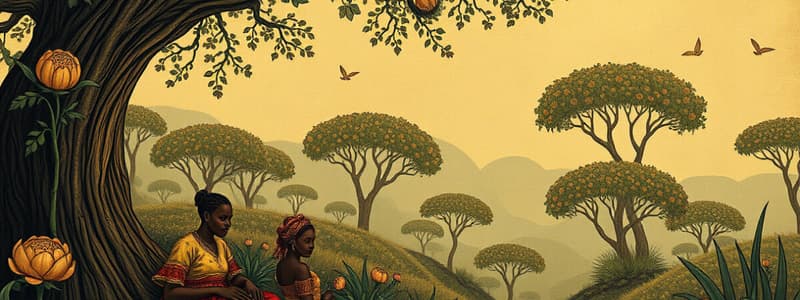Podcast
Questions and Answers
What is Okonkwo's relationship with his father Unoka?
What is Okonkwo's relationship with his father Unoka?
Okonkwo views his father Unoka as weak and in debt, which influences his desire to be successful and not like him.
What action does Okonkwo take to respond to the murder of an Umuofian tribesman’s wife?
What action does Okonkwo take to respond to the murder of an Umuofian tribesman’s wife?
- He chooses to go to war.
- He represents the clan in demanding retribution. (correct)
- He advocates for peace.
- He ignores the meeting.
What does Okonkwo do when he learns of Ikemefuna's fate?
What does Okonkwo do when he learns of Ikemefuna's fate?
- He refuses to participate.
- He kills Ikemefuna himself. (correct)
- He supports the decision.
- He pleads for Ikemefuna's life.
Okonkwo is depicted as a supportive father to Ikemefuna.
Okonkwo is depicted as a supportive father to Ikemefuna.
How does Okonkwo's relationship with his son Nwoye affect his parenting?
How does Okonkwo's relationship with his son Nwoye affect his parenting?
Okonkwo breaks the Week of Peace by beating his wife after she gets her hair __________.
Okonkwo breaks the Week of Peace by beating his wife after she gets her hair __________.
What does Ezinma's survival signify for Ekwefi?
What does Ezinma's survival signify for Ekwefi?
What is the significance of the uri ceremony in Chapter 12?
What is the significance of the uri ceremony in Chapter 12?
Okonkwo's crime during Ezeudu's funeral is considered male aggression.
Okonkwo's crime during Ezeudu's funeral is considered male aggression.
Ikemefuna has a __________ influence on Nwoye.
Ikemefuna has a __________ influence on Nwoye.
Match the following characters with their significance:
Match the following characters with their significance:
Study Notes
Chapter 1
- Okonkwo, a successful wrestler, strives to be the opposite of his father, Unoka, whom he views as weak.
- Umuofia is a significant town among nine other clans; Okonkwo's success in yam farming follows years of struggle.
- Unoka's love for music and language contrasts sharply with Okonkwo's emphasis on strength and achievement.
Chapter 2
- A crisis arises when a woman from Umuofia is killed by a Mbaino tribesman, prompting a call for justice.
- Okonkwo insists on retribution: a virgin girl and a boy must be given to avoid war.
- Ikemefuna, a young boy, is sent to Okonkwo's household, increasing tension with his son Nwoye, whom he perceives as lazy.
Chapter 3
- Okonkwo works as a sharecropper, facing challenges after his father's death, which is viewed as shameful.
- He receives yam seeds to cultivate but faces loss from weather conditions, motivating his determination to succeed.
- Okonkwo values action over inaction, reflecting his disdain for weakness.
Chapter 4
- Ikemefuna adapts to life with Okonkwo's family, positively influencing Nwoye.
- Okonkwo breaks the Week of Peace by beating his wife, leading to societal consequences.
- Okonkwo notices improvements in Nwoye's behavior as they work on farming together.
Chapter 5
- The Feast of the New Yam celebration arises, but Okonkwo’s discomfort with idleness leads to conflict.
- Tensions with his second wife escalate, highlighting his struggle with emotions and the importance of tradition.
- Ekwefi’s affection for Okonkwo stems from their past at wrestling contests.
Chapter 6
- The community wrestling match captivates villagers, showcasing cultural significance and traditions.
- Conversations among women reveal community bonds and foreshadow Ezinma's future potential.
Chapter 7
- Ikemefuna has lived with Okonkwo for three years, cementing a father-son bond.
- An oracle decrees Ikemefuna must die, presenting Okonkwo with a moral dilemma; he ultimately kills Ikemefuna to adhere to cultural expectations.
- Nwoye feels betrayed and distances himself from Okonkwo after the incident.
Chapter 8
- Okonkwo's depression follows Ikemefuna's death, revealing his emotional vulnerabilities.
- A visit to his friend Obierika offers reflection on fatherhood and personal failures, emphasizing the theme of friendship.
- News of death in the community prompts Okonkwo to reassess his attachments and identity.
Chapter 9
- Ezinma's illness reveals her unique bond with her mother, Ekwefi, and their shared suffering with loss.
- The concept of ogbanje illustrates cultural beliefs surrounding life and death among the Igbo people.
- The discovery of Ezinma's iyi-uwa reinforces the theme of fate and the struggle against it.
Chapter 10
- The egwugwu, masked representatives of ancestral spirits, resolve a domestic dispute, showcasing communal justice.
- The case emphasizes the importance of reconciliation and gender roles within marriage.
Chapter 11
- Ekwefi's storytelling reflects cultural values, particularly the significance of names.
- The capture of Ezinma by Chielo symbolizes acceptance of fate and highlights parental contrasts with Okonkwo.
- Ekwefi’s determination to support her child showcases maternal strength.
Chapter 12
- Obierika’s daughter’s uri ceremony illustrates complex societal traditions and the importance of communal support.
- Traditional customs around marriage reflect the gender dynamics and obligations within the community.
Chapter 13
- Ezeudu's death evokes guilt in Okonkwo, reigniting feelings of grief over Ikemefuna.
- An accidental incident during the funeral leads to another tragedy, forcing Okonkwo into exile for seven years.
- The implications of male vs. female crimes explore societal views on intention, fate, and community response to transgressions.
Studying That Suits You
Use AI to generate personalized quizzes and flashcards to suit your learning preferences.
Description
This quiz contains flashcards summarizing chapters 1 to 13 of Chinua Achebe's 'Things Fall Apart'. Focus on key characters, events, and themes, particularly influencing Okonkwo's life and the cultural context of Umuofia. Use these summaries to enhance your understanding of the novel's complexities.




